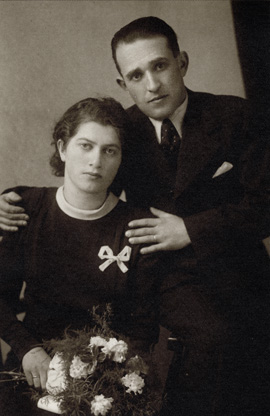Nikolaj Hiršl
Nikolaj was Leopold and Regina Hiršl's fourth child and on of the three Hiršl children to have survived the Holocaust. After his father's death he came home from Grubišno Polje, Croatia, where he was a merchant apprentice at their relatives, to help his mother run the family shop. He was recruited in 1943, like many of his peers, and was sent along with many Jewish boys from his generation to force labour instead of the front.

Unlike many he survived and returned to Murska Sobota only to find out that his wife, Rozalija, and their daughter, Judita, were killed right upon arrival to Auschwitz. He later remarried and lived in Murska Sobota.
His is a fate of one of the few surviving soldiers recruited by the Hungarian army who were sent to labour camps. Older Jewish boys were sent to labour camps from the frontline, while some were sent straight to Auschwitz and the gas chambers. Their fate is one of the most reliable indicators of German systematic approach to the extermination of Jewish community. What is more, the killing of this group of Jews most eloquently speaks of the perversion of genocide. This is why a quote is in order from Die Todesfabrik, a book where the authors Erich Kulka and Ota Kraus, Czech internees to Auschwitz, ten years after the war describe a larger group of Jewish Hungarian soldiers being tricked into submission and then killed in the summer of 1944. These soldiers fought side by side on the Eastern front with Wehrmacht units but were destined for destruction after the Budapest coup by Eichmann, despite the special status granted upon them by Hungarian government.
Dubious and restless the soldiers were addressed by a German officer appealing to their military honour and discipline. The authors of Die Todesfabrik reconstructed the scene:
“I speak to you as members of allied nation who fought with us side by side. I know it is hard to be put in a labour camp, but the front is also here, and you are our allies here as well. This is how you will be treated. But as tens of thousands of people came from your country to work here and given the wartime situation not all of you can be secured separate bath and disinfection. Therefore all of you must sacrifice and make do with common showers and disinfection. I confide in your understanding and discipline …
Those who speak German, please translate my words to others.”
A Hungarian officer spoke to his compatriots asking them to demonstrate they “can not only fight but are ready to adjust to any situation. I ask you for complete silence and that you crowd into the showers and make sure all of us get in.”
According to one witness, Philip Müller, who worked as a stoker in the gas chambers and reported to Kulka and Kraus that same evening, some soldiers even applauded to their officer’s words… and “minutes later they ended their lives as ultimately disciplined bodies.”